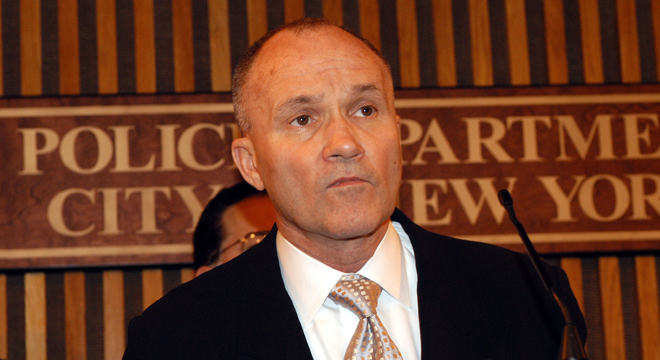This morning, New York City Police Commissioner Ray Kelly gave a speech at a gun violence panel during the annual convention of the National Action Network, the civil rights organization founded and led by one of the more prominent opponents of the NYPD’s “stop and frisk” policy, Rev. Al Sharpton. Critics have likened the stop and frisk tactic to racial profiling because the vast majority of people stopped and searched by the police are African American and Latino, but in his remarks at the NAN convention, Kelly argued it actually helps address inequality in the black community.
Sharpton alluded to his issues with the NYPD when he introduced Kelly at the event.
“We may have disagreements on some policies,” Sharpton began. “But on gun violence, we have worked with Commissioner Kelly.”
Kelly started his speech by invoking Martin Luther King Jr. using a quote from the slain civil rights leader to express the idea an ideal community should be judged “not by the size of our material wealth, but by the depth of our commitment to economic and social justice.” Kelly went on to frame combatting gun violence in New York City as fighting for racial equality.
“For all of the progress that we have made as a society, we still fall short of Dr. King’s dream. Decades after his death, deep inequalities remain,” Kelly said. “Rev. Sharpton was an early and prophetic voice in drawing attention to one of the most pressing inequalities that I am here to discuss and that is the disproportionate share of violence experienced by New York City’s minority community.”
Kelly continued by citing a variety of statistics about murder in the Big Apple.
“African Americans, who represent 23 percent of the city’s population, made up 64 percent of the murder victims and 71 percent of the shooting victims in this city last year,” he said. “African American men between the ages of 16 and 37, who are just four percent of the city’s population, comprise 40 percent of those murdered citywide, 82 percent of these young men were killed with a firearm. As a city, as a society, we cannot stand idly by in the face of these facts.”
After setting this backdrop, Kelly began to describe “Operation Impact,” a strategy he said the NYPD launched in 2003 to address the fact statistics showed violent crime was “concentrated in minority neighborhoods.” Kelly said the first component of this operation, which he described as having been “very successful in reducing violent crime,” involved concentrating new police officers in those minority communities. The second component of “Operation Impact” is stop and frisk, which Kelly never described by that name and initially delicately referred to using the phrase “engagement” at the NAN Convention.
“We combined this strategy with a proactive policy of engagement. We utilized the long established right of the police to stop and question individuals about whom we have reasonable suspicion. In some cases, in which a weapon is suspected, the officer will take the additional step of doing a limited pat down of the person,” said Kelly. “Typically, about half of all stops involved this measure and only nine percent involved a more thorough search. Last year, stops by the police resulted in the seizure of 7,000 illegal weapons, mostly knives, as well as nearly 800 guns. I believed this tactic is lifesaving. It is also lawful and constitutional as upheld by the U.S. Supreme Court in 1968.”
Kelly next directly addressed some criticisms of stop and frisk, specifically that stops occur far too often and the practice has reached record levels.
“The number of stops that we conducted, 530,000 last year, has also been a point of criticism, but with roughly 19,600 patrol officers, this equates to less than one stop, per week, per officer,” Kelly said.
He also argued the NYPD has placed more emphasis on reporting and documenting stops out of a concern for “the sensitivity involved in every step.” Kelly claimed this increase in documentation was a factor behind the rising number of stops. He also said, last year, the NYPD made efforts to “strengthen the oversight and training” involved in the implementation of stop and frisk.
“I’m encouraged that complaints related to stops are down by 58 percent this year. Now, that’s a good sign, we know we can always do better,” said Kelly.
Kelly closed by touting reduced crime in New York, which he said has experienced its “fewest homicides in over 50 years” has become “by far, the safest big city in America.” He said this was largely a benefit to “young men of color” because they are “consistently the majority of murder and shooting victims.”
“If you compare Mayor Bloomberg’s first 11 years in office with the 11 years before that, you will find that there were 7,364 fewer murders,” Kelly said. “That’s 7,364 lives saved and, if history is any guide, they are largely the lives of young men of color.”
Following Kelly’s speech, Sharpton thanked him while also making clear he wasn’t convinced.
“I want you to know we are still unequivocally opposed to stop and frisk in any form because of the racial profiling aspect,” said Sharpton. “I don’t want the media to say that I didn’t respond.”






